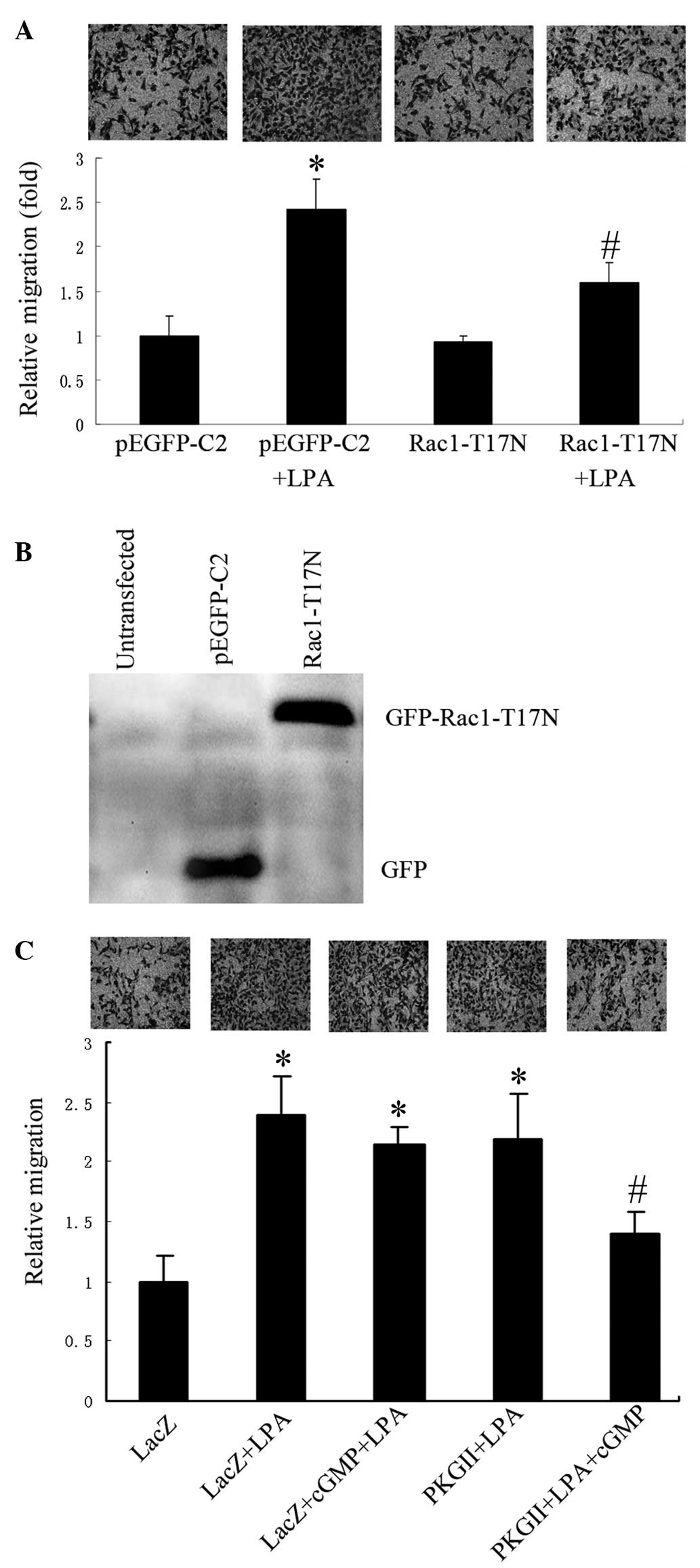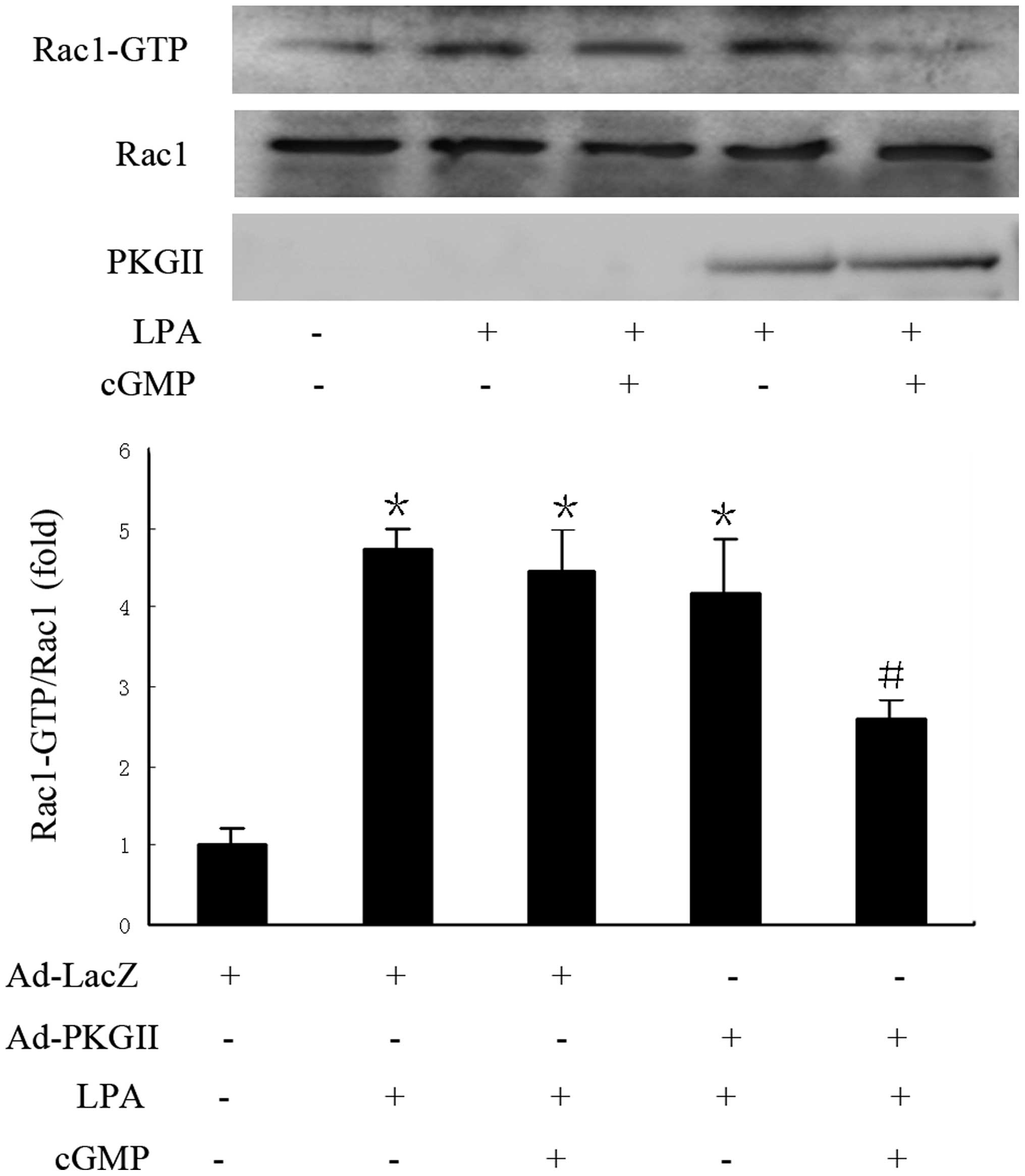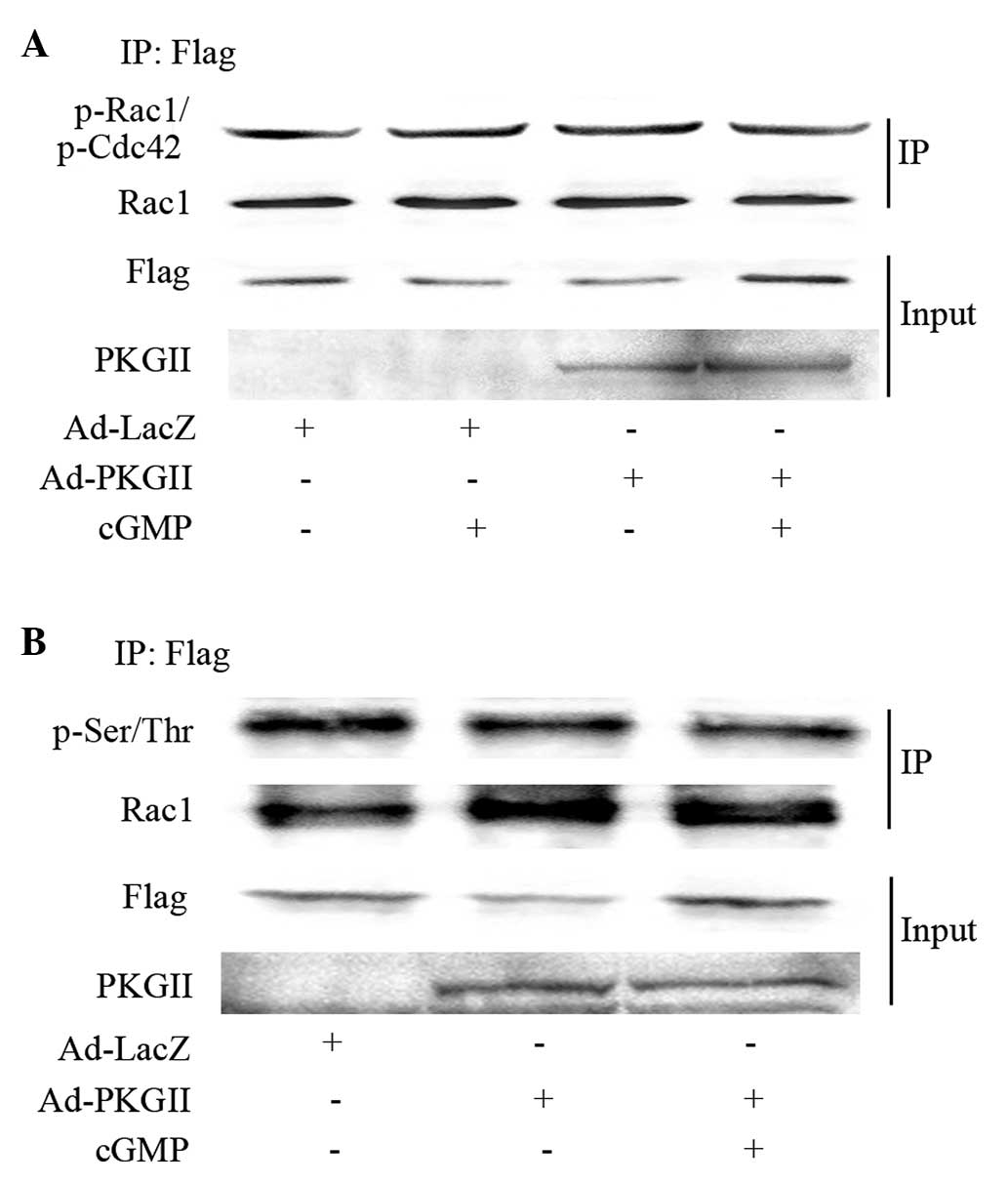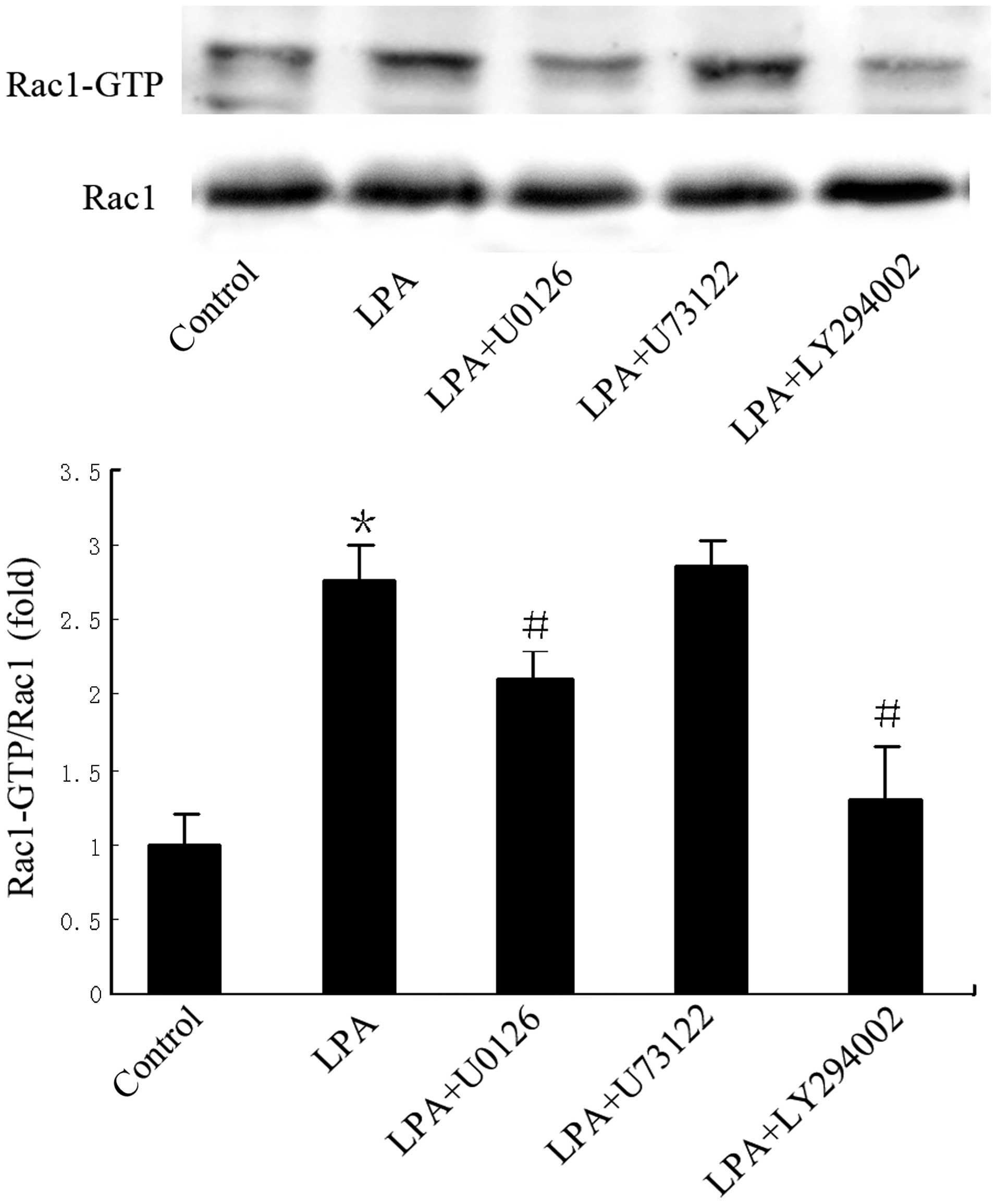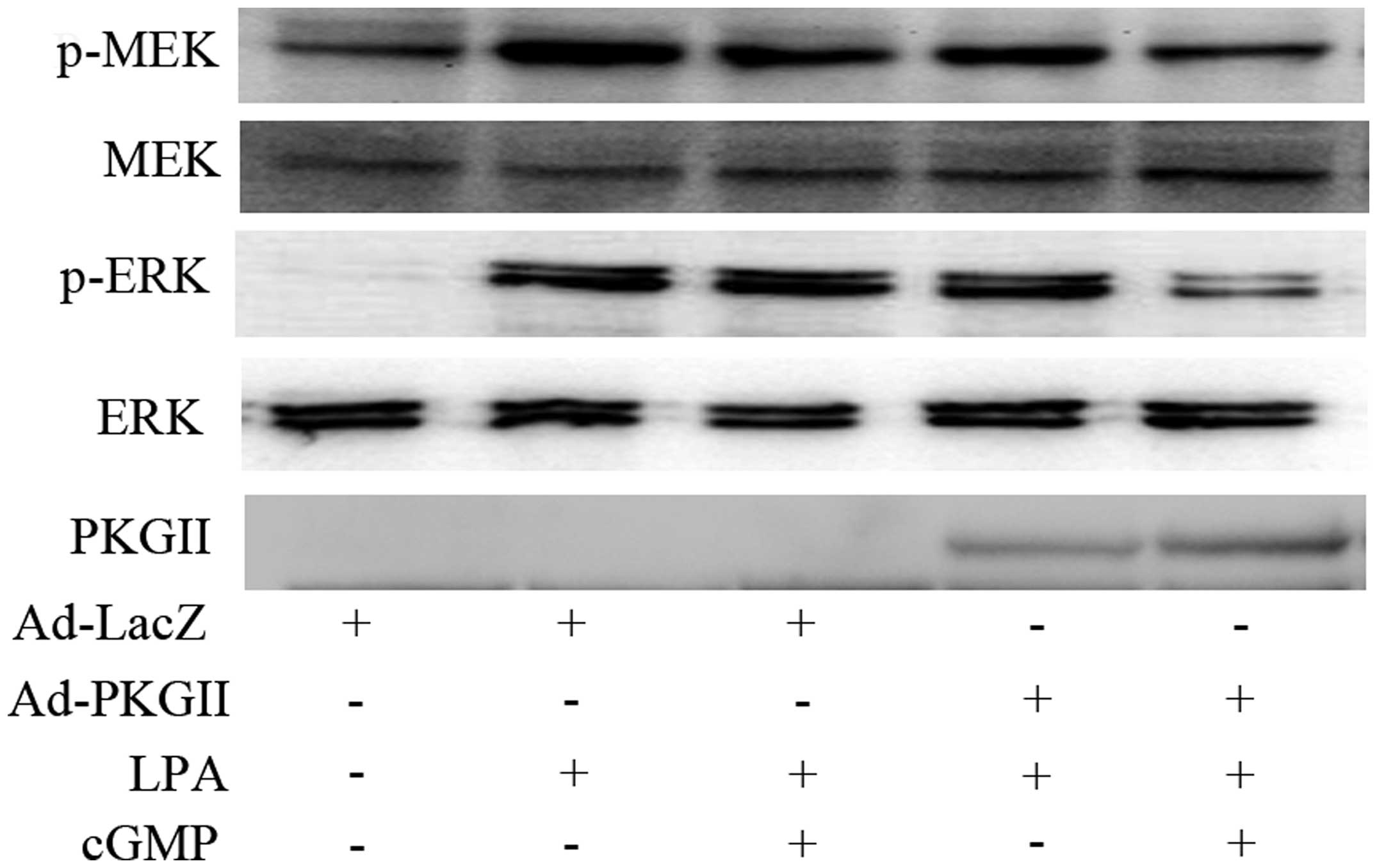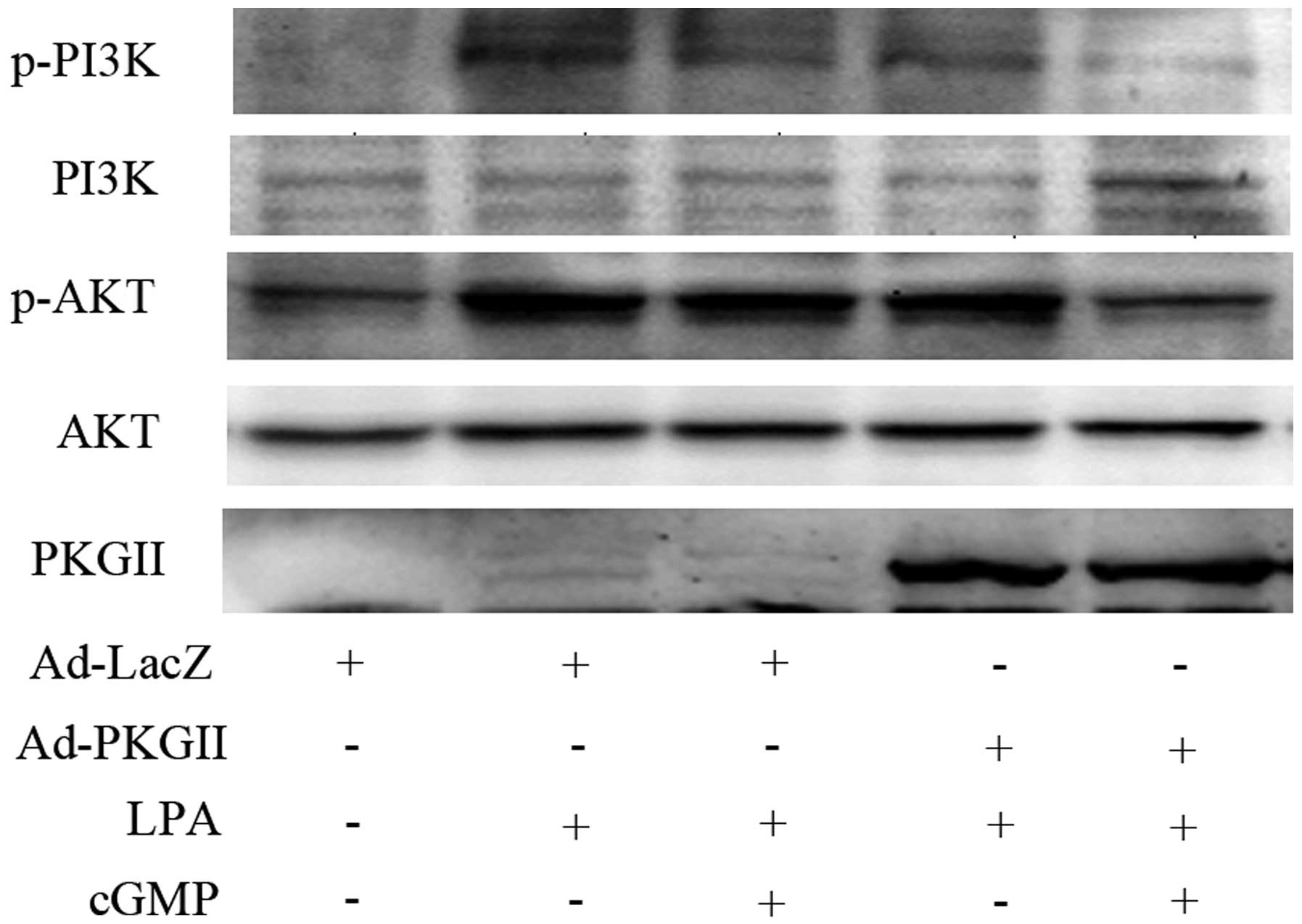|
1
|
Ferlay J, Soerjomataram II, Ervik M,
Dikshit R, Eser S, Mathers C, Rebelo MM, Parkin DM, Forman D and
Bray F: GLOBOCAN 2012 version 1.0, Cancer Incidence and Mortality
Worldwide: IARC CancerBase No. 11. International Agency for
Research on Cancer. [online]. 2013, https://gco.iarc.frAccessed. January
20–2014
|
|
2
|
Pfeifer A, Aszódi A, Seidler U, Ruth P,
Hofmann F and Fässler R: Intestinal secretory defects and dwarfism
in mice lacking cGMP-dependent protein kinase II. Science.
274:2082–2086. 1996. View Article : Google Scholar : PubMed/NCBI
|
|
3
|
Miyazawa T, Ogawa Y, Chusho H, Yasoda A,
Tamura N, Komatsu Y, Pfeifer A, Hofmann F and Nakao K: Cyclic
GMP-dependent protein kinase II plays a critical role in C-type
natriuretic peptide-mediated endochondral ossification.
Endocrinology. 143:3604–3610. 2002. View Article : Google Scholar : PubMed/NCBI
|
|
4
|
Tischkau SA, Mitchell JW, Pace LA, Barnes
JW, Barnes JA and Gillette MU: Protein kinase G type II is required
for night-to-day progression of the mammalian circadian clock.
Neuron. 43:539–549. 2004. View Article : Google Scholar : PubMed/NCBI
|
|
5
|
Swartling FJ, Ferletta M, Kastemar M,
Weiss WA and Westermark B: Cyclic GMP-dependent protein kinase II
inhibits cell proliferation, Sox9 expression and Akt
phosphorylation in human glioma cell lines. Oncogene. 28:3121–3131.
2009. View Article : Google Scholar : PubMed/NCBI
|
|
6
|
Fallahian F, Karami-Tehrani F, Salami S
and Aghaei M: Cyclic GMP induced apoptosis via protein kinase G in
oestrogen receptor-positive and -negative breast cancer cell lines.
FEBS J. 278:3360–3369. 2011. View Article : Google Scholar : PubMed/NCBI
|
|
7
|
Chen YC, Ren F, Sang JR, Tao Y and Xu WR:
Type II cGMP-dependent protein kinase inhibits proliferation of the
gastric cancer cell line BGC-823. Mol Med Rep. 3:361–366.
2010.PubMed/NCBI
|
|
8
|
Jiang L, Lan T, Chen Y, Sang J, Li Y, Wu
M, Tao Y, Wang Y, Qian H and Gu L: PKG II inhibits EGF/EGFR-induced
migration of gastric cancer cells. PLoS One. 8:e616742013.
View Article : Google Scholar : PubMed/NCBI
|
|
9
|
Etienne-Manneville S and Hall A: Rho
GTPases in cell biology. Nature. 420:629–635. 2002. View Article : Google Scholar : PubMed/NCBI
|
|
10
|
Tapon N and Hall A: Rho, Rac and Cdc42
GTPases regulate the organization of the actin cytoskeleton. Curr
Opin Cell Biol. 9:86–92. 1997. View Article : Google Scholar : PubMed/NCBI
|
|
11
|
Ellerbroek SM, Wennerberg K and Burridge
K: Serine phosphorylation negatively regulates RhoA in vivo. J Biol
Chem. 278:19023–19031. 2003. View Article : Google Scholar : PubMed/NCBI
|
|
12
|
Schwarz J, Proff J, Hävemeier A, Ladwein
M, Rottner K, Barlag B, Pich A, Tatge H, Just I and Gerhard R:
Serine-71 phosphorylation of Rac1 modulates downstream signaling.
PLoS One. 7:e443582012. View Article : Google Scholar : PubMed/NCBI
|
|
13
|
Wang Y, Chen Y, Li Y, Lan T and Qian H:
Type II cGMP-dependent protein kinase inhibits RhoA activation in
gastric cancer cells. Mol Med Rep. 9:1444–1452. 2014.PubMed/NCBI
|
|
14
|
Schoentaube J, Olling A, Tatge H, Just I
and Gerhard R: Serine-71 phosphorylation of Rac1/Cdc42 diminishes
the pathogenic effect of Clostridium difficile toxin A. Cell
Microbiol. 11:1816–1826. 2009. View Article : Google Scholar : PubMed/NCBI
|
|
15
|
Jones NP and Katan M: Role of
phospholipase Cgamma1 in cell spreading requires association with a
beta-Pix/GIT1-containing complex, leading to activation of Cdc42
and Rac1. Mol Cell Biol. 27:5790–5805. 2007. View Article : Google Scholar : PubMed/NCBI
|
|
16
|
Du J, Xu R, Hu Z, Tian Y, Zhu Y, Gu L and
Zhou L: PI3K and ERK-induced Rac1 activation mediates
hypoxia-induced HIF-1α expression in MCF-7 breast cancer cells.
PLoS One. 6:e252132011. View Article : Google Scholar : PubMed/NCBI
|
|
17
|
Ray RM, Vaidya RJ and Johnson LR: MEK/ERK
regulates adherens junctions and migration through Rac1. Cell Motil
Cytoskeleton. 64:143–156. 2007. View
Article : Google Scholar : PubMed/NCBI
|
|
18
|
Hu Z, Du J, Yang L, Zhu Y, Yang Y, Zheng
D, Someya A, Gu L and Lu X: GEP100/Arf6 is required for epidermal
growth factor-induced ERK/Rac1 signaling and cell migration in
human hepatoma HepG2 cells. PLoS One. 7:e387772012. View Article : Google Scholar : PubMed/NCBI
|
|
19
|
Schoofs G, Monica TJ, Ayala J, Horwitz J,
Montgomery T, Roth G and Castillo FJ: A high yielding serum-free,
suspension cell process to manufacture recombinant adenoviral
vectors for gene therapy. Cytotechnology. 28:81–89. 1998.
View Article : Google Scholar : PubMed/NCBI
|
|
20
|
Vega FM and Ridley AJ: Rho GTPases in
cancer cell biology. FEBS Lett. 582:2093–2101. 2008. View Article : Google Scholar : PubMed/NCBI
|
|
21
|
Ridley AJ: Rho proteins and cancer. Breast
Cancer Res Treat. 84:13–19. 2004. View Article : Google Scholar : PubMed/NCBI
|
|
22
|
Soon LL, Yie TA, Shvarts A, Levine AJ, Su
F and Tchou-Wong KM: Overexpression of WISP-1 down-regulated
motility and invasion of lung cancer cells through inhibition of
Rac activation. J Biol Chem. 278:11465–11470. 2003. View Article : Google Scholar : PubMed/NCBI
|
|
23
|
Langer DA, Das A, Semela D, Kang-Decker N,
Hendrickson H, Bronk SF, Katusic ZS, Gores GJ and Shah VH: Nitric
oxide promotes caspase-independent hepatic stellate cell apoptosis
through the generation of reactive oxygen species. Hepatology.
47:1983–1993. 2008. View Article : Google Scholar : PubMed/NCBI
|
|
24
|
Muzaffar S, Shukla N, Bond M, Sala-Newby
G, Angelini GD, Newby AC and Jeremy JY: Acute inhibition of
superoxide formation and Rac1 activation by nitric oxide and
iloprost in human vascular smooth muscle cells in response to the
thromboxane A2 analogue, U46619. Prostaglandins Leukot Essent Fatty
Acids. 78:247–255. 2008. View Article : Google Scholar : PubMed/NCBI
|
|
25
|
Routray C, Liu C, Yaqoob U, Billadeau DD,
Bloch KD, Kaibuchi K, Shah VH and Kang N: Protein kinase G
signaling disrupts Rac1-dependent focal adhesion assembly in liver
specific pericytes. Am J Physiol Cell Physiol. 301:C66–C74. 2011.
View Article : Google Scholar : PubMed/NCBI
|
|
26
|
Rolli-Derkinderen M, Toumaniantz G, Pacaud
P and Loirand G: RhoA phosphorylation induces Rac1 release from
guanine dissociation inhibitor alpha and stimulation of vascular
smooth muscle cell migration. Mol Cell Biol. 30:4786–4796. 2010.
View Article : Google Scholar : PubMed/NCBI
|
|
27
|
Hou Y, Ye RD and Browning DD: Activation
of the small GTPase Rac1 by cGMP-dependent protein kinase. Cell
Signal. 16:1061–1069. 2004. View Article : Google Scholar : PubMed/NCBI
|
|
28
|
Forget MA, Desrosiers RR, Gingras D and
Béliveau R: Phosphorylation states of Cdc42 and RhoA regulate their
interactions with Rho GDP dissociation inhibitor and their
extraction from biological membranes. Biochem J. 361:243–254. 2002.
View Article : Google Scholar : PubMed/NCBI
|
|
29
|
Tong J, Li L, Ballermann B and Wang Z:
Phosphorylation of Rac1 T108 by extracellular signal-regulated
kinase in response to epidermal growth factor: a novel mechanism to
regulate Rac1 function. Mol Cell Biol. 33:4538–4551. 2013.
View Article : Google Scholar : PubMed/NCBI
|
|
30
|
Kwon T, Kwon DY, Chun J, Kim JH and Kang
SS: Akt protein kinase inhibits Rac1-GTP binding through
phosphorylation at serine 71 of Rac1. J Biol Chem. 275:423–428.
2000. View Article : Google Scholar : PubMed/NCBI
|
|
31
|
Bian D, Su S, Mahanivong C, Cheng RK, Han
Q, Pan ZK, Sun P and Huang S: Lysophosphatidic Acid Stimulates
Ovarian Cancer Cell Migration via a Ras-MEK Kinase 1 Pathway.
Cancer Res. 64:4209–4217. 2004. View Article : Google Scholar : PubMed/NCBI
|
|
32
|
Kim EK, Yun SJ, Do KH, Kim MS, Cho M, Suh
DS, Kim CD, Kim JH, Birnbaum MJ and Bae SS: Lysophosphatidic acid
induces cell migration through the selective activation of Akt1.
Exp Mol Med. 40:445–452. 2008. View Article : Google Scholar : PubMed/NCBI
|
|
33
|
Jans R, Mottram L, Johnson DL, Brown AM,
Sikkink S, Ross K and Reynolds NJ: Lysophosphatidic acid promotes
cell migration through STIM1- and Orai1-mediated Ca2+(i)
mobilization and NFAT2 activation. J Invest Dermatol. 133:793–802.
2013. View Article : Google Scholar : PubMed/NCBI
|















